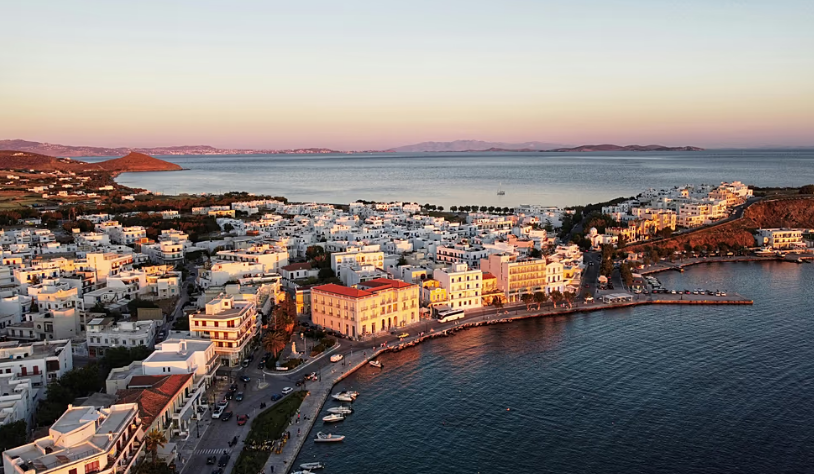Travel
Declining Snowfalls Force Closure of French Alpine Ski Resort
Travel
Azerbaijan Launches New Regional Train Service Linking Ganja and Gabala

This marks the second regional train service that is not connected to Baku and operates outside the capital.
Azerbaijan has introduced a new passenger rail route connecting its second-largest city, Ganja, with the mountain resort city of Gabala, improving access to one of the country’s key tourism destinations. Gabala is famed for its ski resorts, natural landscapes, and cultural events, including the Gabala International Music Festival, which draws visitors and artists from around the world.
The new service is operated by the national state-owned rail company, Azerbaijan Railways (ADY), using Stadler trains, a Swiss manufacturer known for modern, high-quality rolling stock. The route spans approximately 139 kilometers, with a one-way travel time of around 1 hour and 50 minutes. ADY said the service will make travel easier for both locals and tourists alike.
Passengers can choose from four classes: Standard, Standard+, Business, and First Class, with fares starting at 4.80 manats (€2.45). The train stops at Goran, Yevlakh, Laki, and Aghdash stations, and offers connectivity with Baku through a transfer at Laki station, allowing daily travel in both directions.
Travelers from the capital can take the Baku–Gazakh train to Laki station, arriving at 10:50 a.m. local time, and continue to Gabala on the new service at 11:12 a.m. The return journey allows passengers to board the Gabala–Laki service at 18:45, connecting to the Gazakh–Baku train at 19:02.
Gabala offers a range of attractions for visitors. Its surrounding mountains, forests, lakes, and waterfalls make it ideal for skiing, hiking, and cable car rides. Year-round activities and cultural events have made Gabala a growing destination for both domestic and international tourists.
Ganja, the country’s second-largest city, is celebrated as the birthplace of the 12th-century poet Nizami Ganjavi. The city preserves his legacy through museums, monuments, and cultural sites, most notably the Nizami Mausoleum. The new train service enhances accessibility to these historical and cultural landmarks, making it easier for visitors to experience Ganja’s rich heritage.
The launch of the Ganja–Gabala train highlights Azerbaijan’s ongoing efforts to expand regional rail connectivity outside the capital and support tourism development. Officials expect the service to boost local economies, encourage domestic travel, and provide a convenient, sustainable alternative to road transport for both leisure and business travelers.
Travel
Ryanair Announces Major Route Cuts Across Europe in 2026

Ryanair has revealed plans to cut several routes across Europe in 2026, citing rising airport charges, aviation taxes, and operational costs. The move will reduce roughly three million seats and affect destinations in Spain, France, Germany, Belgium, Portugal, and other countries, with smaller cities expected to feel the greatest impact.
In Germany, Ryanair will eliminate 24 routes during the Winter 2025/2026 schedule, cutting nearly 800,000 seats. Airports affected include Hamburg, Berlin, Cologne, Memmingen, Frankfurt-Hahn, Dresden, Dortmund, and Leipzig. Operations at Leipzig, Dresden, and Dortmund will remain suspended throughout 2026. The airline attributed the cuts to high air traffic control and security fees, combined with German aviation taxes. Ryanair criticized the government for not following through on promises to reduce these charges, contrasting Germany with countries such as Ireland, Spain, and Poland, where aviation taxes are lower or being removed.
Spain will see a reduction of about 1.2 million seats from the summer 2026 schedule, following cuts of roughly one million seats in winter 2025. Flights to Asturias, Vigo, and Tenerife North will be stopped entirely, while the Santiago de Compostela and Jerez bases will remain closed. The airline said disputes with airport operator Aena over high fees and government regulations on cabin baggage charges were key reasons for the reductions. Ryanair plans to shift capacity to larger Spanish airports and lower-cost destinations in Italy, Croatia, Morocco, Sweden, and Albania.
In France, Ryanair has already cut 750,000 seats across 25 routes, suspending services to Bergerac, Brive, and Strasbourg. While flights to Bergerac will resume in summer 2026, services to Brive and Strasbourg remain halted. The airline warned additional French regional routes could be impacted next year.
Belgium faces reductions at Brussels and Charleroi, where Ryanair will remove 20 routes and one million seats, accounting for about 22 percent of its Belgian capacity. The airline pointed to a new aviation tax doubling fees to €10 per passenger and potential local taxes at Charleroi as reasons for the cuts.
Portugal will lose all six Ryanair routes to the Azores from the end of March 2026, affecting about 400,000 passengers and reducing national capacity by roughly 22 percent. The airline blamed rising air traffic control fees, the EU Emissions Trading System, and a new €2 travel tax. Ryanair said operational challenges, including airport staff strikes, have also contributed to the decision.
Ryanair is also scaling back flights in Bosnia and Serbia for summer 2026, reducing weekly departures from Banja Luka and Niš to redirect capacity to higher-demand markets such as Croatia.
While the airline continues to expand in other regions, including the UK, Finland, and Italy, the 2026 cuts highlight the financial pressures facing low-cost carriers in markets with high taxes and fees. Ryanair has called on governments to reduce charges to maintain competitiveness and avoid further route reductions.
Travel
Travelers Seek European Alternatives as Overtourism and Heat Hit Popular Destinations

As Europe’s southern hotspots face overtourism and soaring summer temperatures, travelers are turning to lesser-known destinations that offer similar experiences without the crowds. Cities such as Barcelona, Venice, and Mykonos have struggled with high hotel prices, long lines, protests against tourism, and extreme heat, prompting visitors to look for quieter alternatives.
In Spain, Girona has emerged as a popular substitute for Barcelona. Just an hour away, the city offers medieval architecture, a charming Jewish Quarter, and panoramic views from the Passeig de la Muralla, all without the cruise-ship chaos. Girona is also more affordable, allowing visitors to enjoy local cuisine, pastries, and ice cream while wandering its historic streets.
Slovenia’s capital, Ljubljana, has become a sought-after alternative to Venice. The city’s canals, pastel buildings, and lively café culture mirror the Italian city’s charm, but at a more relaxed pace and lower cost. Visitors can explore the Old Town, climb to Ljubljana Castle for sweeping views, and enjoy riverbank dining along the scenic waterways.
Greek travelers seeking a quieter escape from Mykonos are increasingly visiting Tinos. This island features whitewashed villages, pristine beaches, and a traditional Cycladic atmosphere. It also offers cultural highlights, including the Church of Panagia Evangelistria, local marble art, and hiking routes with panoramic views, making it a more authentic and peaceful option for 2026 holidays.
Italy’s Amalfi Coast has its own alternative in Salerno, a historic port city with medieval architecture, dramatic coastlines, and lower prices. Visitors can explore local markets, enjoy fresh seafood, and use Salerno as a base for trips to Amalfi, Positano, or Pompeii, all while experiencing authentic Italian life away from tourist throngs.
Croatia’s Rovinj offers a quieter version of Dubrovnik. The town features Venetian architecture, pastel-colored waterfronts, and cobbled streets, making it ideal for romantic getaways. Travelers can visit St. Euphemia Church, explore hidden coves, and enjoy seafood at local restaurants, all while avoiding Dubrovnik’s intense peak-season crowds.
For those seeking French culture without Parisian crowds, Toulouse provides a compelling alternative. Known as the Pink City for its terracotta architecture, Toulouse offers riverfront walks along the Garonne, canal-side strolls along the UNESCO-listed Canal du Midi, and historic sites such as the Basilique Saint-Sernin and Couvent des Jacobins. The city also features regional cuisine, from duck dishes to cassoulet, with a more relaxed and affordable atmosphere.
As travel patterns shift, these lesser-known European destinations are gaining popularity, providing a mix of history, culture, and scenic beauty while offering respite from the challenges of overcrowded tourist hubs.
-

 Entertainment1 year ago
Entertainment1 year agoMeta Acquires Tilda Swinton VR Doc ‘Impulse: Playing With Reality’
-

 Business2 years ago
Business2 years agoSaudi Arabia’s Model for Sustainable Aviation Practices
-

 Business2 years ago
Business2 years agoRecent Developments in Small Business Taxes
-

 Home Improvement1 year ago
Home Improvement1 year agoEffective Drain Cleaning: A Key to a Healthy Plumbing System
-

 Politics2 years ago
Politics2 years agoWho was Ebrahim Raisi and his status in Iranian Politics?
-

 Business2 years ago
Business2 years agoCarrectly: Revolutionizing Car Care in Chicago
-

 Sports1 year ago
Sports1 year agoKeely Hodgkinson Wins Britain’s First Athletics Gold at Paris Olympics in 800m
-

 Business2 years ago
Business2 years agoSaudi Arabia: Foreign Direct Investment Rises by 5.6% in Q1





























